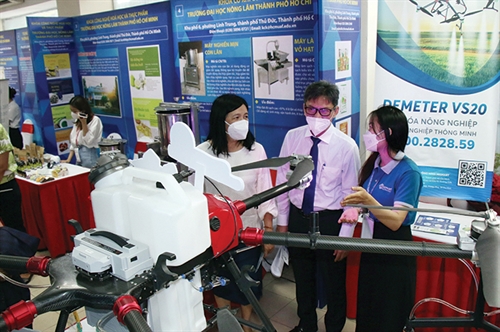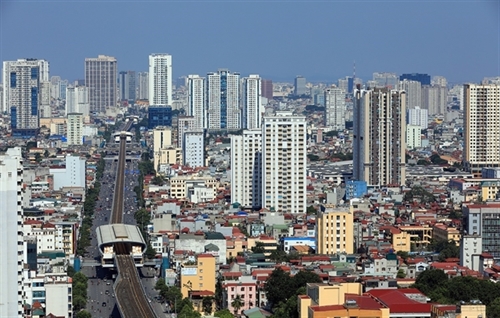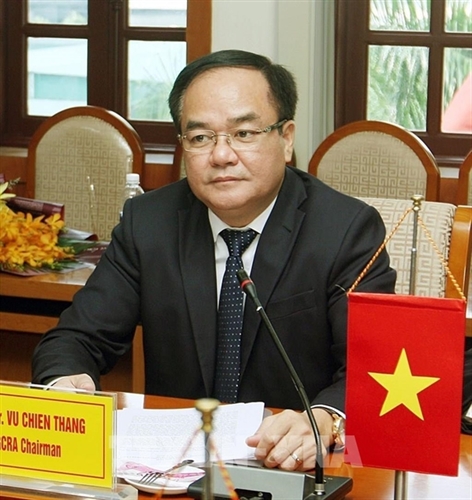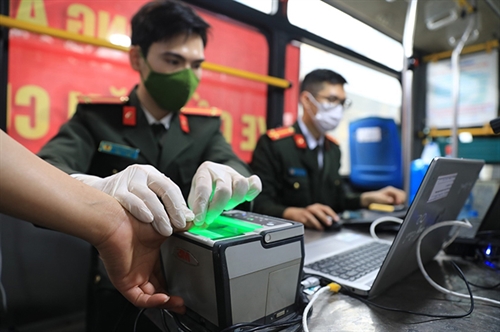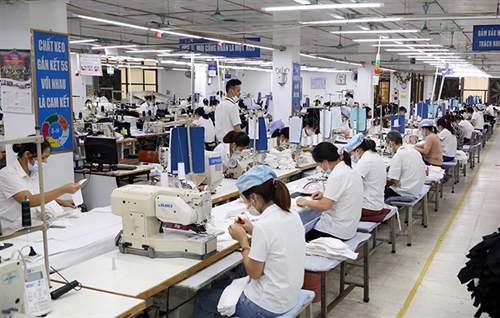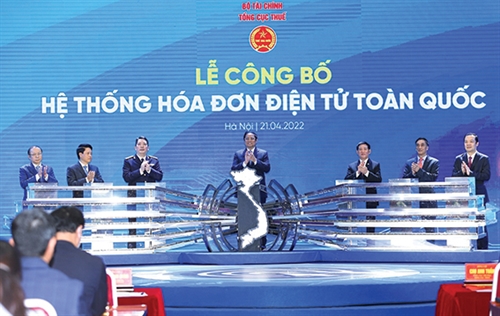After more than 20 years of implementing the ASEAN Framework Agreement on Services, Vietnam has recorded positive developments in the process of international integration in general and ASEAN integration in particular, thereby promoting the development of the national economy and accumulate valuable experiences for international economic integration. However, to realize Vietnam’s commitments on services within ASEAN, it is required to apply comprehensive solutions to ensure compliance with the country’s membership obligations, while best protecting the interests of the country and service providers engaged in trade in services with ASEAN partners.
Nguyen Huu Hoang
Vietnam Court Academy
Practical implementation of Vietnam’s commitments on trade in services within ASEAN
The documents of the 13th National Party Congress stressed: “To strictly implement the signed international commitments and trade agreements; to take advantage of the favorable international environment to improve integration capacity and the level of benefits from integration, making worthy contributions to socio-economic development and environmental protection in the region and the world.”[1] In addition to the commitment on market opening within the World Trade Organization (WTO), Vietnam has realized its market opening commitments under free trade agreements (FTAs) with a higher level of market opening than that committed in the WTO which are applicable only to certain FTA partners. By January of 2022, Vietnam has joined 15 FTAs that have taken effect in practice.[2] In general, most of the FTAs Vietnam has signed mainly focused on commitments on trade in goods, while the number of commitments on service market opening is limited, with only several service sub-sectors more than those in the WTO.[3] Within ASEAN, Vietnam has liberalized trade in services through the fulfillment of its commitments under the ASEAN Framework Agreement on Services (AFAS) and commitments on freedom of labor movement and, most recently, signed the ASEAN Trade in Services Agreement (ATISA).
With regard to the characteristics of trade in services, legal barriers are mainly related to policies, institutions and regulations. Therefore, the implementation of service commitments of the countries in the ASEAN Economic Community (AEC) in general and of Vietnam in particular will mainly center on issuing or revising policies, regulations and laws of each country.
The AFAS establishes general principles on services within ASEAN as a basis for the ASEAN member states to negotiate for the gradual opening of service sectors through service commitment packages. So far, the AFAS has conducted negotiations for 10 packages of general commitments on services, eight packages of separate commitments on financial services and 11 packages of separate commitments on air transport services. Service commitment packages under the AFAS are implemented by the positive list approach, using the central product classification (CPC) method as in the GATS. In 2018, Vietnam launched the Tenth Package of Commitments, clearly demonstrating its efforts in international integration in the field of trade in services.
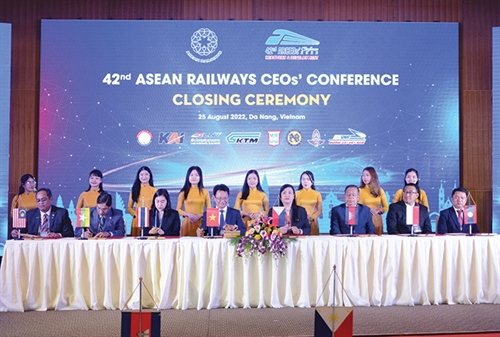 |
| ASEAN Railways CEOs sign a memorandum of understanding during their 42nd Conference in Da Nang city in August 2022__Photo: Van Dung/VNA |
Implementation of general commitments under AFAS
For market opening commitments in the general commitments, Vietnam has set conditions binding on foreign service providers at different levels. These conditions include restrictions on the number of service providers; restrictions on the total value of transactions or assets; restrictions on the total number of service activities or the number of services provided; restrictions on the number of employees; restrictions on the form of enterprises (joint-venture or wholly foreign-owned enterprises), and restrictions on foreign holding rate.
The above conditions are essential ones for the level of market opening. The AFAS allows the member countries to decide by themselves on wider market opening (easing conditions for foreign suppliers) as appropriate. It can be seen that the general commitments for the eighth, ninth and tenth packages under the AFAS are equivalent to the commitments within the WTO, under which Vietnam makes commitments on market opening by mode 1 (cross-border supply) and mode 2 (consumption abroad). To date, Vietnam’s law does neither limit the number of service providers nor limit the number of foreign workers in an enterprise. However, these conditions still need to comply with the general provisions of the 2020 Law on Investment (Investment Law), the 2019 Labor Code and relevant government decrees. Specifically, according to the Investment Law, foreign service providers will be allowed to apply market access regulations like domestic investors, except the cases specified in Article 9.2 of the Investment Law. In addition, on March 26, 2021, the Government issued Decree 31 to guide a number of articles of the Investment Law. The decree was accompanied by the list of sectors and trades in which foreign investors are not yet granted market access and the list of sectors and trades, including service sectors, in which foreign investors are subject to conditional market access. In addition to market access conditions for the sectors and trades specified in the Investment Law and Decree 31, foreign service providers must, when conducting investment and business activities in Vietnam, meet other specific conditions.[4]
So, it can be seen that, with the general commitments related to mode 1 and mode 2, Vietnam’s commitments are relatively open to service providers with fewer restrictions.
To fulfill the general commitments related to mode 3, Vietnam allows foreign service providers, particularly ASEAN service providers, to establish their commercial presence in the committed forms. Vietnam has also made amendments to relevant laws, e.g., the Investment Law, the Commercial Law and the 2020 Law on Enterprises, and issued a number of decrees and documents guiding these laws. All these documents comply with Vietnam’s law as well as its general commitments as for mode 3.
However, there remain barriers to foreign service providers, such as provisions on commitments related to capital contribution and share purchase by foreign service providers and guiding texts of the Investment Law and Decree 31. For instance, Article 9.3.a of the Investment Law provides that market access conditions for foreign investors as specified in the list of sectors and trades in which foreign investors are subject to market access restrictions include: “a/ The percentage of ownership of charter capital of foreign investors in an economic organization”. Therefore, one of the conditions for foreign investors to contribute capital to Vietnamese enterprises is to meet the condition on charter capital ownership rate. This provision is also referred to in Article 17.10 of Decree 31 regarding the cap on the holding rate of foreign investors under treaties on investment.
As for mode 4, like other ASEAN member states, Vietnam has almost made no commitment. The provision of services by mode 4 is regulated mainly by the Investment Law; the 2019 Law Amending a Number of Articles of the Law on Foreigner’s Entry into, Exit from, Transit through and Residence in Vietnam, and Government Decree 75 of 2020 detailing a number of articles thereof; and the 2019 Labor Code and guiding texts. Despite efforts to revise laws and policies, the general commitments for mode 4 seem to have received less attention than mode 3.
For the List of most-favored-nation (MFN) exemptions in the general commitments, Vietnam makes exceptions to the MFN principle or MFN exemptions, and the principle of defining natural persons and legal persons of any third country that are currently and will be eligible for the treatment in the future. The MFN treatment signifies the recognition of the right to equal treatment among foreign states in the relationships between host countries and natural persons and legal persons of different states. Vietnam’s national treatment commitments in the eighth, ninth and tenth packages of commitments set the conditions that Vietnam applies to impose restrictions on foreign service providers which are similar to Vietnam’s commitments under the GATS.
Implementation of specific commitments under AFAS
For specific commitments under the AFAS, Vietnam has issued or revised policies with the goal of realizing commitments in specific sectors, typically key service sectors such as banking, securities, distribution, insurance, and telecommunications. So far, Vietnam has completed the ninth package of commitments and is proceeding with the tenth package of commitments. On December 29, 2020, the Government issued Resolution 185 approving the Protocol to implement the tenth package of commitments on services within the framework of the AFAS. Accordingly, the Government assigns the Ministry of Planning and Investment to take charge of, and coordinate with the Ministry of Industry and Trade and related agencies in, implementing the Schedule of Commitments attached to the Protocol.
The participation in mutual recognition arrangements (MRAs) constitutes a key factor in the integration in trade in services of the ASEAN member states in general and Vietnam in particular. MRAs set out equivalent requirements and procedures for verifying conditions for professional practice in contracting states so as to ensure that services supplied to consumers in a country at least meet the minimum requirements on the quality of services in that country. For the time being, the ASEAN has concluded nine MRAs in assorted services sectors and sub-sectors.[5] Vietnam, as a contracting party to these MRAs, has strictly abided by the processes set by the ASEAN, thus ensuring the fulfillment of its commitments. For instance, the country has set up a committee to supervise the implementation of MRAs, established principles of registration of conformity with the ASEAN’s standards of skilled workers in each field, adjusted relevant policies and held workshops on MRAs that Vietnam has signed.
For workers of ASEAN countries, the availability of an occupational standard framework recognized by the ASEAN community enable them to move to other regional countries for work, opening up many opportunities for exchange and improvement of professional skills and income. As for Vietnam, the Prime Minister issued in 2016 Decision 1982/QD-TTg approving Vietnam’s National Qualifications Framework. Later in 2020 and 2021, the cabinet head approved two national qualifications frameworks for higher education in the 2020-25 period and for vocational education in the 2021-25 period (Decision 436/QD-TTg of 2020 and Decision 1232/QD-TTg of 2021), aiming to realize the targets set in the 13th National Party Congress’s Resolution, i.e., “effectively deploying the national education system according to the objectives of fundamentally and comprehensively renewing education and training; diversifying training methods based on models of open education and national qualifications frameworks, following the market rules and meeting the requirements of the Fourth Industrial Revolution; and preparing human resources for digital transformation and development of the digital economy and digital society.
Implementation of commitments under ATISA
Vietnam has participated in many new-generation FTAs with the goal of expanding commitments on services, removing trade barriers, and creating a fair and transparent competitive environment for investors and service providers. In particular, concerning trade in services in ASEAN, on October 18, 2021, the Vietnamese Government issued Resolution 131/NQ-CP approving the ASEAN Trade in Services Agreement (ATISA). In principle, the ATISA establishes frameworks for implementation of liberalization commitments under the AFAS, reducing statutory barriers that set discriminations among service providers, and providing a solid legal foundation and a more transparent mechanism for the service market in the region. Regarding the opening of service markets, the ATISA applies the negative approach, i.e., the parties commit to opening all service sectors, except sectors and sub-sectors on the List of Non-Conforming Measures - NCM, which is established separately for each ASEAN member country according to its commitments. This is a new approach compared to AFAS’s positive approach that allows only the opening of services that are clearly listed in the Schedule of Commitments. In its Resolution 131/NQ-CP, the Vietnamese Government assigned the Ministry of Planning and Investment to assume the prime responsibility for, and coordinate with related ministries and agencies in, organizing the implementation of the ATISA after it comes into force. Meanwhile, related ministries and sectors were tasked to work with the Ministry of Planning and Investment to draw up the List of Non-Conforming Measures based on the tenth Package of Commitments under the AFAS, ensuring rights and interests of Vietnam and Vietnam’s commitments within ASEAN, and at the same time, to proactively review, amend and supplement the country’s legal documents for implementation of the ATISA.
It is expected that the ATISA will replace the AFAS and lay a new foundation for promoting trade in services and improving the competitiveness of businesses in the ASEAN Community. However, the ATISA is not yet a complete text but rather the initial step of establishing specific principles in the future. Like the AFAS, the ATISA is accompanied with protocols designed to implement its 10 packages of commitments. In addition, as provided in the ATISA’s Article 36 regarding transitional arrangements relating to the AFAS, once the ATISA comes into force, it will not immediately and completely replace and terminate the AFAS. Therefore, at present the ATISA cannot completely replace previous regulations on trade liberalization.Hence, the fact that new-generation FTAs, including the ATISA, have a much higher level of commitments on opening up the service market than those under the WTO does not mean that the process of liberalization of trade in services in Vietnam will achieve significant progress in the near future. The application of the new negative approach when the country joins these agreements does not mean that the new negative approach is more effective than the old one. On the other hand, the finalization and drawing of NCMs under the ATISA by ASEAN member countries takes a long time, say, nine years for Vietnam and 15 years for Laos, Myanmar and Cambodia. Moreover, there is still a lack of ASEAN inspection and supervision mechanisms related to the implementation of NCMs. Therefore, despite the fact that new-generation FTAs introduce a more innovative and modern approach to trade liberalization than the AFAS or WTO, their practical effectiveness needs to be proven over time.
Solutions to improve Vietnam’s law on services
In order to help foreign enterprises continue expanding their activities in the Vietnamese market and help domestic enterprises deeply integrate into the global market for development, Vietnam’s law on services should be further improved to be conformable with treaties to which Vietnam is a contracting party.
Firstly, it is necessary to attach importance to improving policies on opening the service market according to mode-3 and mode-4 international commitments. For mode-3 commitments, authorities should adopt policies to gradually remove trade barriers toward foreign service providers; meanwhile for mode-4 commitments, it is required to design open-door policies in line with commitments in the AEC and WTO. These policies must be consistent with domestic policies and commitments in FTAs to which Vietnam is a contracting party. Furthermore, related ministries and sectors should review and revise regulations and policies to ensure the consistency of domestic legal documents with Vietnam’s commitments in the WTO in general and AFAS in particular in a way that is more conformable with requirements of the AEC Blueprint as well as the trend of liberalization of trade in services set out by the AEC. In addition, the Law on Foreigners’ Entry into, Exit from and Residence in Vietnam; the Labor Code and its guiding texts; the Law on Investment and its guiding documents should also be further improved.
Secondly, priority should be given to formulating and strengthening enforcement and monitoring mechanisms to ensure that AEC commitments are implemented in reality with the goal of expanding opportunities for service providers to enter the Vietnamese market. For example, for retail services, it is necessary to formulate specific policies and criteria on economic needs tests (ENT) applicable to foreign retail service providers. In addition to existing criteria, it is necessary to study and issue new regulations and criteria on procedures for setting up of retail establishments, assessment of socio-economic impacts, warehousing conditions, size of the population served and auxiliary services, and management and marketing.
Thirdly, policies to promote human resource development need to be completed. The development of professional qualifications as well as necessary skills for human resources of the service sector plays the role of connecting human resources with service businesses, aiming to bring about more job opportunities and reduce recruitment expenses for businesses. Besides, there should be policies to help training institutions develop international joint training programs in combination with job placement for service workers, thereby forming a direct link between workers and businesses. In addition, it is necessary to promote the training and further training of a pool of officials who have a deep understanding of international law, trade and investment and are capable of working in the international environment, particularly those directly engaged in international economic integration and international dispute settlement.
Fourthly, competent authorities should promulgate regulations and policies to restrict monopoly of service providers. As big service providers might manipulate the market, corporations holding dominant positions in certain areas would not be allowed to open more branches or form link chains. For example, in the field of logistic services, large foreign distribution enterprises always tend to manipulate the logistics network, thus putting pressure on their domestic rivals, so it is necessary to adopt policies to prevent this from occurring.
Lastly, in order to properly prepare for the implementation of MRAs within the framework of the AEC, Vietnam should better prepare for the movement of skilled workers within ASEAN through the formulation and improvement of regulations on and standards for workers to be recognized as “ASEAN skilled workers” in the fields in which MRAs among ASEAN countries are available as well as improvement of regulations on national qualifications frameworks.
In addition to the packages of commitments on financial and air transport services, and movement of natural persons, Vietnam’s general commitment packages, with commitments on reduction and removal of barriers to trade in services, are in line with the roadmap for building the AEC. However, with the rapid removal of investment conditions, Vietnam’s regulations inevitably remain inadequate. Therefore, regulations should be revised to be compatible with general commitments on trade in services that Vietnam has signed. Besides, although Vietnam’s commitments in recent packages under the AFAS are higher than those in the WTO, foreign service providers still face a number of domestic barriers, particularly those relating to capital contribution, conditions for establishing branches, etc., when doing business in Vietnam. That’s why the Investment Law and the Commercial Law should be revised to lift barriers to foreign service providers while still protecting domestic production. In addition, the national qualifications frameworks, together with systems for monitoring their implementation, should be further improved to remove barriers regarding to diplomas and certificates for foreign individual service providers.-

